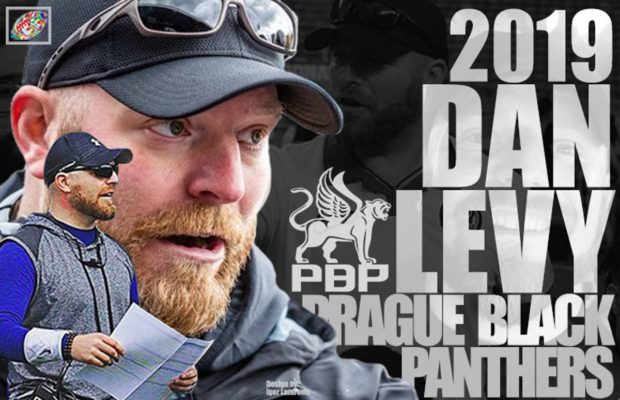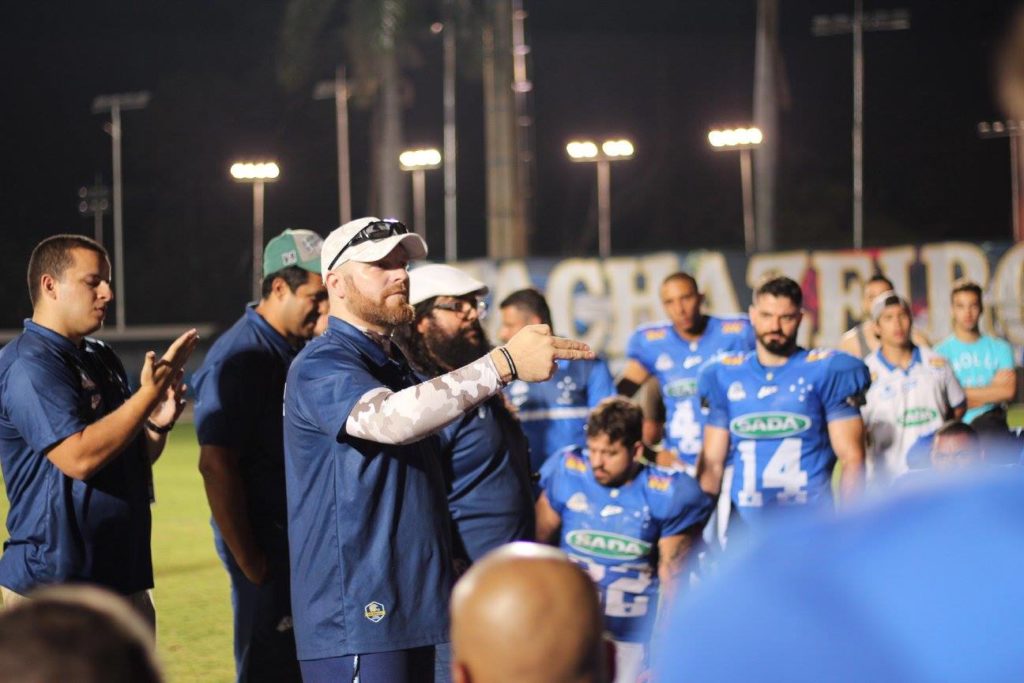Czech Republic: Daniel Levy returns as HC of Prague Black Panthers

The Prague Black Panthers have re-signed head coach Daniel Levy for the 2019 season after he guided them to an unbeaten season in the Czech Republic, which saw them win their sixth straight title.
The year before in Brazil, Levy guided the Belo Horizonte Sada Cruzeiro to a Brazil Bowl victory in their first year in existence. The 34 year old Levy, who is now in his ninth season coaching internationally ,explains his motivations and the reasons for returning to continue to build a real football program in Prague.
AFI: You guided the Black Panthers to an undefeated season in 2018. What prompted your return to the team?
Levy: The short answer is that I love the city, the team treated me well and I see a lot of potential here to build something special. Coming in, I was looking for a place where I could enjoy my quality of life outside of football and where there was also a group of players and management receptive to my ideas and vision. That’s what I’ve found here with PBP, and as long as things continue in this direction, I see this being a pretty happy marriage, so to speak.
Levy: You are assembling a powerhouse of a team including an import quarterback. What are the plans for 2019?
Levy: Playing in the Austrian Football League next year, we know it is going to be a step up competition-wise and we have to be ready. With the QB, our longtime leader Jan Dundacek retired at the end of the season, so that was one of our top priorities going into the off season. We feel like we grabbed a great player in Dylan Potts, someone who has proven himself as a dynamic competitor in the AFL. If you look at our entire import group, it’s maybe the most excited I’ve been about a group of imports since I’ve been coaching. And not just on paper because these are guys who in many cases I have met in person and worked with. Obviously Matt Vinal coming back for his third season is huge for us. And I had the opportunity to work with Herbert Gamboa in Mexico with the Europe Warriors, and bringing in a versatile playmaker like him is simply a steal. Then with the coaches, James Brooks is a guy who is familiar with Prague, he knows defense and is someone who if needed could strap on the pads and go dominate any level of competition. Michael Chevalier is a young guy who has been coaching OL at San Diego Mesa College and came highly recommended, as well.
And to be able to accomplish all of this within the parameters of what was a really tight budget–to be aggressive for this upcoming season while staying true to our goal of not sacrificing long-term stability for short-term gain–I am really proud of what we have accomplished on the import side.
But it all starts with the core group of local players and coaches, and the work they’ve been putting in this offseason–the part that doesn’t show up on social media–is what is going to really decide how far we go moving forward, both in our on-field results and the culture that we are trying to build within this program.
AFI: You are entering your ninth season of coaching football overseas. What has that journey been like?
Levy: It has had its ups and downs, but I wouldn’t trade my experiences it for anything. I am always learning, every year, not just as a football coach but also in terms of just how my perspective has grown. These opportunities have really shaped who I am and taught me lessons I don’t think I would have ever learned otherwise. At the end of the day, this is a job, but I happen to think it’s a pretty cool one.
AFI: You stated last year that you wanted to turn Prague into a football program. Have you succeeded in laying the foundation?
Levy: I think we have, and it’s not something I can claim all the credit for. I have my ideas and my vision when it comes to program building, but none of that is executed without the right people believing in it. We have a core group of players here who are really special. There is a true family atmosphere here, and the brotherhood is real. Every team talks about it but these guys live it. That creates a positive atmosphere and makes guys want to be a part of this. It makes retired players want to stick around and help with the coaching and management. It creates stability because the team has something about it bigger than football. We have definitely had to emphasize professionalism, and it is a fine line to walk because you want guys to take the competitive side seriously without killing that brotherhood that makes it special. But in short, things are definitely moving in the right direction, and that could never happen without the players, coaches, and management that are here, buying into the vision and pushing this boulder up the hill.
AFI: You have said that your consider being an international football coach your career and that you hoped PBP would become your home. Do you still feel strongly about that?
Levy: I do, maybe even more so after year one. I have been lucky enough to coach in some great places. Norway, Italy, Brazil–those are all countries where I will always feel a strong connection, where I have people who I am close to and things that I miss all the time. But where I am in my career and my life, finding a place where I feel less like an import and more like someone at home was important. I love where I live, I have a dog now, my girlfriend has a job here. There is much more of a feeling that I am building a life, and that makes going to work and being with my team that much more enjoyable because there is never that nagging thought of “this is only temporary.” Of course all things come to an end, but for now this feels like just the beginning. So yes, I do feel at home in Prague, with PBP, and now more than ever like this is a career that I am building as an international coach.
AFI: How do you think being exposed to so many different cultures in the past decade has affected your coaching style?
Levy: I think I’ve learned patience. When you coach international football, the problems you have are usually the problems you don’t expect. You can’t shut down when something goes wrong, and you have to learn to focus on solutions rather than worry about problems. If something bad happens, you drop a four letter word, and then you figure out how to fix it or work around it. I try to live this way in both my personal and professional life. It is the mentality that I want my players and my staff to have. We have to always plan, to pay attention to detail, but also be adaptable and focus, not worry. Shit will always go wrong. How are we going to respond to it? That’s what’s in our control. So I have really learned a lot about patience and the importance of time as a finite resource. If we waste time worrying or being angry about how unfair the football gods are treating us, then we won’t have the time left that we need to be a successful team.
